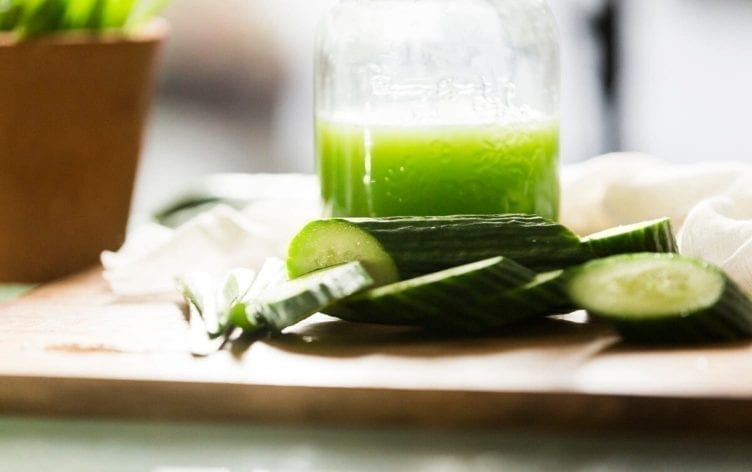
Trend-Busting: Should You Be Drinking Cucumber Juice?
If 2019 could be boiled down into one wellness trend, it would probably be celery juice. The bright green vegetable juice found favor among celebrities and influencers and peppered Instagram feeds the world over. But now that 2019 is in the rearview, it’s time for another hot trend of dubious health benefit. So, move over celery juice — or at least make some space in the fridge — because cucumber juice wants in on the action.
Cucumber juice has been popularized by Anthony William, aka the Medical Medium, the same guy who brought celery juice into the light. He’s not a doctor, which is important to note. But he claims cucumber juice can cleanse and detox the body, aid the digestive system and provide anti-inflammatory benefits to assist those with autoimmune disorders. And that’s just for starters.
To get the most benefit, he suggests drinking 8–16 ounces each day. Cucumber juice and celery juice each clock in at around 40 calories per 8-ounce serving, so both are low-calorie options — especially compared to fruit juices (i.e., fresh orange juice is about 110 calories per 8-ounces).
Sound advice or just the latest gimmick? To learn more, we spoke with Amy Goodson, MS, RDN.
“Cucumbers are low in calories yet high in potassium, manganese and vitamins K and C,” says Goodson. They have a high water content, which can help you stay hydrated throughout the day. Goodson also points to a study showing cucumber may help reduce inflammation in skin cells, making the refreshing vegetable an appealing choice after days in the sun. So, the issue isn’t with cucumbers — they’re a great choice for snacks, salads and even the occasional juice. The issue is juicing just isn’t the best way to consume them.
DRINKING YOUR VEGETABLES
“While you still get lots of nutrients when you juice a fruit or vegetable versus eat it, you lose the fiber content,” says Goodson. She notes that cucumbers aren’t as fiber-packed as some other fruits and vegetables, but one medium-sized cucumber contains about 2 grams of fiber, with most of that being found in the skin.
If you’d rather drink your cucumbers, consider blending them instead of juicing them, as this method still retains most of the food’s fiber.
“As a rule of thumb, pureeing or blending fruits and vegetables allows you to get the nutrient benefit as well as the fiber benefit,” she adds.
CUCUMBER JUICE VERSUS CELERY JUICE
“Both cucumber and celery juice provide manganese, magnesium, vitamin A and potassium, but celery is the winner in the nutrient categories of vitamin C and vitamin K,” says Goodson.
She also notes that much of the research done on the benefits of cucumbers and celery has been performed on animals or conducted in test tubes, making it difficult to extrapolate the results to humans.
THE BOTTOM LINE
It’s unlikely drinking these juices can provide the myriad benefits suggested by William, but Goodson adds that consuming either of these hydrating vegetables “sure can’t hurt!”
So, if you like the flavor and you want to add some extra vitamins and nutrients to your diet, cucumbers and celery are healthy choices to get the job done. But try consuming them in their natural state to get the most benefit. And know that, while vegetable juice can certainly be part of a healthy diet, it’s no cure-all.





